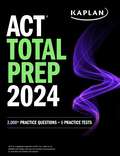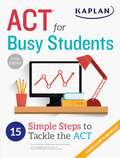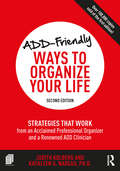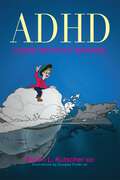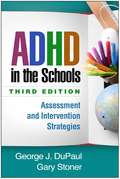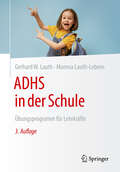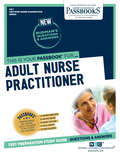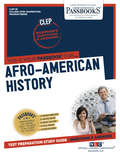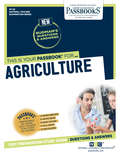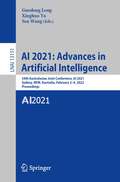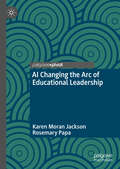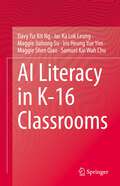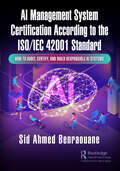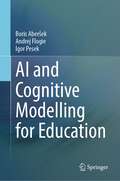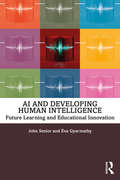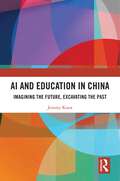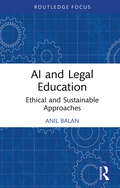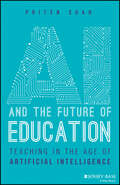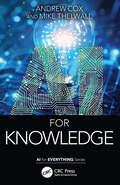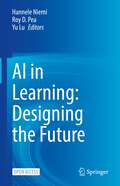- Table View
- List View
ACT Total Prep 2024 (Kaplan Test Prep)
by Kaplan Test PrepKaplan is an Official Teaching Partner of the ACT. ACT Total Prep 2024, Kaplan&’s biggest ACT prep book, has the most content review, efficient strategies, and realistic practice to help you score higher. We have everything you need in one big book, plus a full year of access to online resources—including more practice tests, a bigger Qbank than ever (500 questions), and video lessons—to help you master each section of the ACT.We're so certain that ACT Total Prep offers all the guidance you need to excel on the ACT that we guarantee it: after studying with our online resources and book, you'll score higher on the ACT—or you'll get your money back.Essential Review6 full-length Kaplan practice tests with detailed answer explanations (2 printed in the book and 4 tests online)More than 2,000 practice questions with detailed explanations, including a 500-item online Qbank4 Test Yourself sections — test-like practice on mixed topics to ensure you learn the material, unit by unitOne-year access to our online center with additional quizzes and videos to help guide your studyPre-quizzes to help you figure out what you already know and what you can skipMixed practice quizzes after every chapter to assess how much you&’ve learnedA practice question at the beginning of each lesson to help you quickly identify its focus and dedicated practice questions after every lesson to test your comprehensionEfficient Strategy&“On Test Day&” strategy notes in every math chapter to help you remember that the ACT math test is primarily a strategy test&“Reflect&” pages that help you evaluate your comfort level with the topics and make a plan for improving before the test after completing each chapterOnline study-planning tool helps you target your prep no matter how much time you have before the test.Expert GuidanceWe know the test: Our learning engineers have put tens of thousands of hours into studying the ACT, and we use real data to design the most effective strategies and study plans.Kaplan's books and practice questions are written by veteran teachers who know students—every explanation is written to help you learn.We invented test prep—Kaplan (kaptest.com) has been helping students for over 80 years.
ACT for Busy Students: 15 Simple Steps to Tackle the ACT (Kaplan Test Prep)
by Kaplan Test PrepKaplan's ACT for Busy Students provides streamlined prep to help you score higher even if you're short on study time. Targeted review, essential practice, and expert advice aid you in mastering the most important skills, so you can face the test with confidence. Kaplan Test Prep is the Official Partner for Live Online Prep for the ACT. For more information visit kaptest.com/onlinepreplive.Kaplan is so certain that ACT for Busy Students offers the guidance you need that we guarantee it: After studying with our book, you'll score higher on the ACT—or your money back.Essential ReviewReview the most important skills and concepts for all sections of the ACT1 full-length practice test with complete answer explanationsCustomized, step-by-step study schedules based on how much time you have until the testMore than 250 practice questionsStrategies and tips for the optional Writing testExpert GuidanceKaplan's expert teachers make sure our tests are true to the ACT9 out of 10 Kaplan students get into one or more of their top choice colleges
ADD-Friendly Ways to Organize Your Life: Strategies that Work from an Acclaimed Professional Organizer and a Renowned ADD Clinician
by Kathleen Nadeau Judith KolbergAcclaimed professional organizer Judith Kolberg and Dr. Kathleen Nadeau, renowned ADHD clinical psychologist, are back with an updated edition of their classic text for adults with ADD. Their collaboration offers the best understanding and solutions for adults who want to get and stay organized. Readers will enjoy all new content on organizing digital information, managing distractions, organizing finances, and coping with the "black hole" of the Internet. This exciting new resource offers three levels of strategies and support: self-help, non-professional assistance from family and friends, and professional support; allowing the reader to determine the appropriate level of support.
ADHD - Living without Brakes
by Martin L. KutscherThis concise and highly accessible book contains everything that parents and busy professionals need to know about ADHD. The author describes the spectrum of ADHD, the co-occurring symptoms, and common difficulties that parents face. The rest of the book focuses on solutions, based around four rules. Rule number one is keeping it positive: punishments can change behavior, but only positive approaches can improve attitude. Rule number two is keeping it calm: it's difficult thinking clearly enough to solve problems logically if you are feeling overwhelmed. Rule number three is keeping it organized: this rule relates particularly to the child's school life. Rule number four is to keep doing rules one to three..Finally, Dr. Kutscher discusses the role of medication for treating ADHD. The concluding chapter summarizes the information covered and can also be read as a complete, freestanding text. Useful checklists and further reading recommendations are also included. Realistic and optimistic, this book is the ideal source of information and advice for parents and professionals who are trying to keep up with children who are living without brakes.
ADHD in the Schools, Third Edition
by Robert Reid George J. Dupaul Gary StonerThis highly regarded practitioner guide provides state-of-the-art tools for supporting the academic and behavioral success of K-12 students with attention-deficit/hyperactivity disorder (ADHD). The authors explain the learning and behavior difficulties associated with ADHD and describe screening and assessment procedures that facilitate data-based decision making. They show how to develop individualized intervention plans that integrate behavioral, academic, and social supports, in partnership with teachers and parents. Strategies for collaborating with physicians and monitoring students' medication response are also presented. Helpful reproducible forms and handouts can be downloaded and printed in a convenient 8 1/2" x 11" size. New to This Edition: *Reflects a decade's worth of research and clinical advances, plus the growth of multi-tiered service delivery models. *Discusses changes in DSM-5. *Separate chapter on interventions for middle and high school students, with new content on the transition to college. *Updated medication information, case examples, and more.
ADHD in the Schools, Third Edition: Assessment and Intervention Strategies
by Robert Reid George J. Dupaul Gary StonerThis highly regarded practitioner guide provides state-of-the-art tools for supporting the academic and behavioral success of PreK-12 students with attention-deficit/hyperactivity disorder (ADHD). The authors explain the learning and behavior difficulties associated with ADHD and describe screening and assessment procedures that facilitate data-based decision making. They show how to develop individualized intervention plans that integrate behavioral, academic, and social supports, in partnership with teachers and parents. Strategies for collaborating with physicians and monitoring students' medication response are also presented. Helpful reproducible forms and handouts can be downloaded and printed in a convenient 8 1/2" x 11" size. New to This Edition: *Reflects a decade's worth of research and clinical advances, plus the growth of multi-tiered service delivery models. *Discusses changes in DSM-5. *Separate chapter on interventions for middle and high school students, with new content on the transition to college. *Updated medication information, case examples, and more.
ADHS in der Schule: Übungsprogramm für Lehrkräfte
by Gerhard W. Lauth Morena Lauth-LebensKinder und Jugendliche mit ADHS haben es in der Schule oft schwer. Dieses Buch präsentiert die neuesten wissenschaftlichen Erkenntnisse und bietet ein praxiserprobtes Programm zur Begleitung und Förderung dieser Schülerinnen und Schüler. Es richtet sich an Lehrpersonen in Schule und Beruf sowie an Schulberater, Schulsozialarbeiter und Integrationshelfer. Das Programm kann unter verschiedenen Bedingungen angeboten werden: Leiterinnen-Gruppe: Eine Gruppe unter der Leitung einer erfahrenen Pädagogin. Kollegiale Gruppe: 2-3 Lehrkräfte arbeiten gemeinsam an der Umsetzung. Schulinterne Gruppe: Das Programm wird innerhalb der Schule koordiniert. Interdisziplinäre Gruppe: Lehrpersonen aus verschiedenen Schulen oder Arbeitsbereichen tauschen sich aus und entwickeln Maßnahmen. Das Förderprogramm wird unmittelbar mit der eigenen Praxis verknüpft. Hierzu wird ein „Zielkind“ festgelegt, das die Teilnehmenden aktuell unterrichten oder begleiten. Alle Erörterungen finden an seinem Beispiel statt; alle Maßnahmen werden auf seine Situation zugeschnitten und übertragen. Das Programm fördert in verschiedenen Bausteinen ein grundlegendes Verständnis für ADHS, analysiert schwierige Verhaltensweisen und identifiziert Stärken des Kindes. Es ergründet, wie vorteilhaftes Verhalten verstärkt werden kann, und zeigt auf, wie die Lehrkraft vorausschauend lenken kann. Zudem werden Strategien aufgezeigt, wie der Schüler oder die Schülerin in ihrem Lernen unterstützt werden kann und wie die Zusammenarbeit mit Eltern gelingt. Das entwickelte Übungsprogramm wird inkl. Arbeitsmaterialien in diesem Buch so ausführlich vorgestellt, dass Übungsleitende und Lehrkräfte es unmittelbar anwenden können. Ein unverzichtbarer Ratgeber für alle, die sich für die individuelle Förderung von Schülerinnen und Schülern mit ADHS interessieren.
ADULT NURSE PRACTITIONER: Passbooks Study Guide (Certified Nurse Examination Series)
by National Learning CorporationThe Certified Nurse Examination Series prepares individuals for licensing and certification conducted by the American Nurses Credentialing Center (ANCC), the National Certification Corporation (NCC), the National League for Nursing (NLN), and other organizations. The Adult Nurse Practitioner Passbook® provides a series of informational texts as well as hundreds of questions and answers in the areas that will likely be covered on your upcoming exam.
AFRO-AMERICAN HISTORY: Passbooks Study Guide (College Level Examination Program Series (CLEP))
by National Learning CorporationThe College Level Examination Program (CLEP) enables students to demonstrate college-level achievement and earn college credit in various subject areas based on knowledge acquired through self-study, high school and adult courses, or through professional means. The CLEP Afro-American History Passbook® prepares you by sharpening knowledge of the skills and concepts necessary to succeed on the upcoming exam and the college courses that follow. It provides a series of informational texts as well as hundreds of questions and answers in the areas that will likely be covered on your upcoming exam.
AGRICULTURE: Passbooks Study Guide (National Teacher Examination Series (NTE) #Nt-20)
by National Learning CorporationThe National Teacher/PRAXIS Examinations are designed to provide objective measurement of the knowledge, skills and abilities required of teachers. The Passbook® for the Agriculture exam provides hundreds of multiple-choice questions in the areas that will likely be covered on your upcoming certification test.
AGS United States History
by Wayne E. King John L. NappThis book is a story about the United States. As you read the units, chapters and lessons of this book, you will learn about the important people and events that shaped United States history.
AGS United States History
by Wayne E. King John L. Napp*This textbook has been transcribed in UEB, formatted according to Braille textbook formats, proofread and corrected. <P><P>This book is a story about the United States. As you read the units, chapters and lessons of this book, you will learn about the important people and events that shaped United States history.
AGS United States History
by John Napp Wayne KingWelcome to a study of United States history. You may be asking yourself, "Why do I need to know about people, places, and events that happened a long time before I was even born?" When we study the past, we can have a better understanding of why some things happened the way they did. We can learn from the mistakes and the successes of the past. This book is a story of the United States.
AI
by Barbara W. MakarA systematic, phonics-based early reading program that includes: the most practice for every skill, decodable readers for every skill, and reinforcement materials--help struggling students succeed in the regular classroom
AI 2021: 34th Australasian Joint Conference, AI 2021, Sydney, NSW, Australia, February 2–4, 2022, Proceedings (Lecture Notes in Computer Science #13151)
by Xinghuo Yu Sen Wang Guodong LongThis book constitutes the proceedings of the 34th Australasian Joint Conference on Artificial Intelligence, AI 2021, held in Sydney, NSW, Australia, in February 2022.* The 64 full papers presented in this volume were carefully reviewed and selected from 120 submissions. The papers were organized in topical sections named: Ethical AI, Applications, Classical AI, Computer Vision and Machine Learning, Natural Language Processing and Data Mining, and Network Analysis. *The conference was postponed from December 2021 to February 2022 and held virtually due to the COVID-19 pandemic.
AI Changing the Arc of Educational Leadership
by Rosemary Papa Karen Moran JacksonAs artificial intelligence becomes an all-encompassing issue in education and beyond, this book seeks to answer how it will change the arc of educational leadership in K-12 schooling. Educators and leaders serve as the champions and gatekeepers of technology use in schools. They need to consider how AI can change education for the better while keeping in mind cultural, social, and emotional concerns that cannot be isolated from educational settings. Jackson and Papa examine existing literature and include insightful interviews with professionals in AI and education to understand how educators currently perceive and use AI. They also illustrate the similarities and differences in how educators and A.I.ED developers envision AI's present and future.
AI Literacy in K-16 Classrooms
by Samuel Kai Chu Davy Tsz Ng Jac Ka Leung Maggie Jiahong Su Iris Heung Yim Maggie Shen QiaoArtificial Intelligence is at the top of the agenda for education leaders, scientists, technologists and policy makers in educating the next generation across the globe. Beyond applying AI in daily life applications and educational tools, understanding how to learn and teach AI is increasingly important. Despite these emerging technology breakthroughs, AI learning is still new to educators especially to K-16 teachers. There is a lack of evidence-based studies that inform them about AI learning, including design principles for building a set of curriculum content, and pedagogical approaches as well as technological tools. Teaching AI concepts and techniques from programming languages and developmentally appropriate learning tools (e.g., robotics, serious games, software, intelligent agents) across different education levels emerged in recent years. The primary purpose of this book is to respond to the need to conceptualize the emerging term “AI literacy” and investigate how to teach and learn AI in K-16 education settings.This book examines different aspects of learning artefacts, pedagogies, content knowledge and assessment methods of AI literacy education, from theoretical discussions to practical recommendations for curriculum and instructional design. An exhaustive summary of current evidence with examples is illustrated in this book, as well as cutting-edge research that serves as an AI literacy model for different countries’ contexts. Part I, “Conceptualizing AI literacy”, provides a detailed discussion on the development of the concepts and frameworks on AI literacy education, discusses the differences and similarities between AI in education (AIED) and AI literacy education, and illustrates the reasons why K-16 students need to learn AI. These concepts are brought together in Part II, “K-16 AI literacy education” to further summarize the pedagogies, learning content, learning tools and assessment methods to inform K-16 educators how to design their AI instruction at each education level. After that, part III “AI literacy for instructional designers” explores how instructional designers (i.e., AI developers and teachers) prepare themselves to become ready to design developmentally appropriate tools, platforms, services and curricula to empower students with AI literacy skills.
AI Management System Certification According to the ISO/IEC 42001 Standard: How to Audit, Certify, and Build Responsible AI Systems
by Sid Ahmed BenraouaneThe book guides the reader through the auditing and compliance process of the newly released ISO Artificial Intelligence standard. It provides tools and best practices on how to put together an AI management system that is certifiable and sheds light on ethical and legal challenges business leaders struggle with to make their AI system comply with existing laws and regulations, and the ethical framework of the organization.The book is unique because it provides implementation guidance on the new certification and conformity assessment process required by the new ISO Standard on Artificial Intelligence (ISO 42001:2023 Artificial Intelligence Management System) published by ISO in August 2023. This is the first book that addresses this issue.As a member of the US/ISO team who participated in the drafting of this standard during the last 3 years, the author has direct knowledge and insights that are critical to the implementation of the standard. He explains the context of how to interpret ISO clauses, gives examples and guidelines, and provides best practices that help compliance managers and senior leadership understand how to put together the AI compliance system to certify their AI system. The reader will find in the book a complete guide to the certification process of AI systems and the conformity assessment required by the standard. It also provides guidance on how to read the new EU AI Act and some of the U.S. legislations, such as NYC Local Law 144, enacted in July 2023.This is the first book that helps the reader create an internal auditing program that enhances the company’s AI compliance framework. Generative AI has taken the world by storm, and currently, there is no international standard that provides guidance on how to put together a management system that helps business leaders address issues of AI governance, AI structure, AI risk, AI audit, and AI impact analysis. ISO/IEC 42001:2023 is the first international mandatory and certifiable standard that provides a comprehensive and well-integrated framework for the issue of AI governance. This book provides a step-by-step process on how to implement the standard so the AI system can pass the ISO accreditation process.
AI and Cognitive Modelling for Education
by Boris Aberšek Andrej Flogie Igor PesekThis book offers a groundbreaking approach to bridging the gap between various disciplines involved in cognitive modeling in education. By drawing on the fields of learning, neuro science, cognitive science, neurobiology, and computer science, it provides a new perspective on how we can integrate these disciplines with education to create more effective learning environments. The main objective of this book is to delve into the ethical, sociological, and technological questions surrounding the introduction of intelligent and smart learning environments in education. By analyzing these issues, this book aims to bridge the gap between the various disciplines involved in cognitive modeling and education, while highlighting the benefits and risks associated with these advancements. With the emergence of AI-based tutors, coaches, and learning environments, students now have access to a new type of self-learning and self-training that was previously unavailable. Distance learning has become increasingly popular in recent years, and the use of computer-assisted learning tools has revolutionized the way we think about education. The goal of education must be to instill in students a desire to learn for themselves, and this can only be achieved through active, self-directed, and reflective learning. With intelligent tutoring systems, students are empowered to take an active role in their own education, rather than simply being passive recipients of information. This book offers practical strategies for teachers to facilitate this transition, enabling them to act as facilitators and guides rather than one-way communicators. By embracing this new approach to education, we can help students become lifelong learners who are equipped with the skills they need to succeed in the 21st century. As we cannot predict the future with certainty, the true effects of education may only be revealed in the long run, making it critical to understand the potential consequences of introducing these new learning tools. By exploring these complex topics, this book offers valuable insights for educators, policymakers, and anyone interested in the future of education.
AI and Developing Human Intelligence: Future Learning and Educational Innovation
by John Senior Éva GyarmathyAs the relationship between AI machines and humans develops, we ask what it will mean to be an intelligent learner in an emerging, socio-dynamic learningscape. The need for a new global view of intelligence and education is the core discussion of this future-focussed collection of ideas, questions, and activities for learners to explore. This fascinating guide offers activities to understand what needs to be changed in our educations systems and our view of intelligence. As well as exploring AI, HI, the future of learning and caring for all learners, this book addresses fundamental questions such as: How do we educate ourselves for an increasingly uncertain future? What is the purpose of intelligence? How can a curriculum focussing on human curiosity and creativity be created? Who are we and what are we becoming? What will we invent now that AI exists? AI and Developing Human Intelligence will interest you, inform you, and empower your understanding of "intelligence" and where we are going on the next part of our journey in understanding what it is to be human now and tomorrow.
AI and Education in China: Imagining the Future, Excavating the Past
by Jeremy KnoxThis book explores the relationships between artificial intelligence (AI) and education in China. It examines educational activity in the context of profound technological interventions, far-reaching national policy, and multifaceted cultural settings. By standing at the intersection of three foundational topics – AI and the recent proliferation of data-driven technologies; education, the most foundational of our social institutions in terms of actively shaping societies and individuals; and, finally, China, which is a frequent subject for dramatic media reports about both technology and education – this book offers an insightful view of the contexts that underpin the use of AI in education, and promotes a more in-depth understanding of China. Scholars of educational technology and digital education will find this book an indispensable guide to the ways new technologies are imagined to transform the future, while being firmly grounded in the past.
AI and Legal Education: Ethical and Sustainable Approaches (Routledge Research in the Law of Emerging Technologies)
by Anil BalanThis book provides a comprehensive interdisciplinary analysis of the sustainable and ethical integration of artificial intelligence (AI) within legal education, offering practical strategies for balancing innovation with ethical responsibility. Discussing the intersection of legal studies, technology and ethics, the book focuses on AI's role in reshaping professional education.With the rising demand for digital transformation in legal education and the increasing scrutiny of AI's ethical impact, this book explores the potential of AI to enhance legal learning and practice, while critically examining the challenges of data privacy, algorithmic bias and equitable access to technology. Outlining a framework for incorporating AI into the law curriculum, the book equips the readers with both cutting-edge technological skills and a deep understanding of AI’s ethical and societal implications. Drawing on a wide range of sources, including industry data and academic research, the book offers grounded, actionable guidance on implementing AI in a way that promotes inclusivity, sustainability and long-term relevance. It addresses the needs of legal education institutions, faculty and students, providing them with the tools to navigate the evolving legal landscape while maintaining ethical standards.The book will also be of interest to researchers in the fields of law, education and AI ethics.
AI and the Future of Education: Teaching in the Age of Artificial Intelligence
by Priten ShahClear away the fog surrounding AI in education—and regain your peace of mind Among teachers, there is a cloud of rumors, confusion, and fear surrounding the rise of artificial intelligence. AI and the Future of Education is a timely response to this general state of panic, showing you that AI is a tool to leverage, not a threat to teaching and learning. By understanding what AI is, what it does, and how it can be used to enhance education, you can let go of anxiety and uncertainty, and learn to embrace artificial intelligence. It's true that, along with tremendous opportunities, AI presents some challenges for the field of education. In this book, Priten Shah, a Harvard M.Ed. with a robust background in educational innovation, helps you face these challenges head on, so you can gain the knowledge and skills you need to use AI effectively in your classroom. Thanks to this thorough consideration of ethical considerations and practical approaches, you can develop your own strategy for leveraging AI in administrative tasks, lesson design, professional development, and beyond. Understand what AI and machine learning are, and learn about new developments like ChatGPT Discover strategies for engaging students more fully using AI Automate administrative tasks, grading and feedback, and assessments Use AI in innovative ways to promote higher-order thinking skills Examine ethical considerations of AI, including the achievement gap, privacy concerns, and bias For K-12 educators, as well as leaders and policymakers who want to understand the role of technology in education, AI and the Future of Education is a valuable resource that can change AI from an unknown entity to an indispensable tool.
AI for Knowledge (AI for Everything)
by Mike Thelwall Andrew CoxAI for Knowledge explores the question of whether artificial intelligence (AI) is transforming knowledge access and creation for the good. AI is accelerating our access to knowledge through search, recommendation, summarisation, translation and a proliferating range of tools with AI built in. Generative AI is further changing how we use and create information at home and in the workplace. Yet AI also has a dark side with hallucination, bias and lack of explainability, as well as potential for harmful impacts on social equity and the environment.The book investigates how AI will impact everyday knowledge discovery, understanding and creation. It considers both the positive benefits and the many informational and ethical challenges, including the impact on our wider information culture. It then weighs up the impact on scholarship, in science, social science and the humanities and including the processes of scholarly communication. It explains the role of libraries and archives and how they could be enhanced using AI. It concludes by showing how governments can regulate AI to ensure social benefit and outlines what we as individuals need to know about AI.The book helps the reader see through some of the AI hype to understand much more clearly what are the issues around the impact of AI on knowledge access and creation, including the implications for environmental sustainability and the power of Big Tech. What emerges is a nuanced picture of potential benefit and risk, especially when we consider the experiences of those with less privileged access to the digital, particularly those outside the Global North.
AI in Learning: Designing the Future
by Hannele Niemi Yu Lu Roy D. PeaAI (Artificial Intelligence) is predicted to radically change teaching and learning in both schools and industry causing radical disruption of work. AI can support well-being initiatives and lifelong learning but educational institutions and companies need to take the changing technology into account. Moving towards AI supported by digital tools requires a dramatic shift in the concept of learning, expertise and the businesses built off of it. Based on the latest research on AI and how it is changing learning and education, this book will focus on the enormous opportunities to expand educational settings with AI for learning in and beyond the traditional classroom. This open access book also introduces ethical challenges related to learning and education, while connecting human learning and machine learning. This book will be of use to a variety of readers, including researchers, AI users, companies and policy makers.
